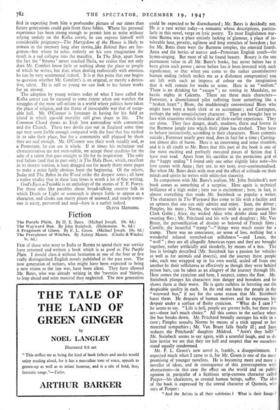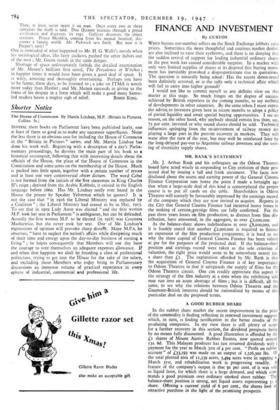Fiction
9s. 6d.)
Few of those who went to India or Burma to spend their war service have returned and written a book which is as good as The Purple Plain. I should class it without hesitation as one of the four or five really distinguished English novels published in the past year. The new generation of writers, who might have been expected to bring a new vision to the late war, have been silent. They have allowed Mr. Bates, who was already writing in the 'twenties and 'thirties, to leap ahead and seize material they neglected. The new generation could be expected to be disenchanted ; Mr. Bates is decidedly not. He is a rare writer today—a romantic whose descriptions, particu- larly in this novel, verge on lyric poetry. To most Englishmen war- time Burma was a- place entirely lacking higlamour, a place of in- tolerable heat, poverty, ugliness and long stretches of boredom ; but for Mr. Bates there were the Burmese temples, the emerald lizards, Anna and the bevies of nurses and—Protestant English touch—the hymn-singing. But most of all he found beauty. Beauty is the one permanent value in all Mr. Bates's books, but never before has it been given such power • never before has it been invested with such significance, so that when you come to the rather unsatisfactory human ending (which strikes me as a dishonest compromise) you are left with such an impress of colour on the imagination that it will remain for weeks to come. Here is no "realism." There is no drinking for " escape " ; no rotting in Mandalay, no hectic nights in Calcutta. -There are three main characters— Forrester, a disenchanted pilot suffering front something like a " broken heart " ; Blore, the maddeningly conventional Blore who might have been a bank clerk or an accountant ; and Carrington, perhaps the only unsatisfactory character. They are brought face to face with situations Which invalidate all their earlier experience. They are alone. They face danger,. death, madness, thirst and horror in the Burmese jungle into which their plane has crashed. They haye to behave instinctively, according to their characters. Blore commits suicide ; Forrester nearly goes mad, does in fact for a time ; Carring- ton almost dies of burns. Here is an interesting and tense situation, and it is all credit to Mr. Bates that this part of the book is one of the most exciting and perfectly executed pieces of fiction that I have ever read. Apart from his sacrifice to the pernicious god of the " happy ending" I found only one other slightly false note—his love scenes with Anna ; they are, to my taste, over-sentimentalised. But when Mr. Bates deals with men and the effect of solitude on their minds and spirits he writes with white-hot sincerity.
In comparison with Mr. Bates's realism, Mr_ John Steinbeck's new book comes as something of a surprise. Here again is technical brilliance of a high order ; here too is excitement ; here, in fact, is almost everything that made Mr. Steinbeck so popular a writer. The characters in The Wayward Bus come to life with a facility and an aptness that one can only admire and enjoy. -Juan, the driver; Pimples, his mate ; Norma, the waitress with a secret passion for Clark Gable ; Alice, the wicked Alice who drinks alone and likes swatting flies ; Mr. Pritchard and his wife and daughter ; Mr. Van Brunt, the personification of destiny so beloved of French films ; Camille, the beautiful " tramp "—." things were much easier for a tramp. There was no conscience, no sense of loss, nothing but a wonderful relaxed stretched-cat selfishness "—and Louie, the " wolf " ; they are all allegedly American types and they are brought together, rather artificially and slenderly, by means of a bus. The bus is lovingly described (Mr. Steinbeck has a passion for vehicles as well as for animals and insects), and the journey these people take, each one wrapped up in his own world, sealed off from one anoter, by their selfishness as effectively as though they were behind prison bars, can be taken as an allegory of the journey through life. Here comes the cynicism and here, I suspect, comes the flaw. Mr. Steinbeck plunges his characters into danger and boredom and he shows them at their worst. He is quite ruthless in ferreting out the despicable quality in each. In the end one hates the people in the "wayward bus," if not for the same reason that Mr. Steinbeck hates them. He despairs of human motives and he expresses his despair under a surface of flashy cynicism. " What do I care ? " he seems to say. "Life is hell, people are greater hells, but there you are—there isn't much choice." All this comes to the surface when the bus breaks down. Mr. Pritchard brutally outrages his wife in a cave ; Pimples assaults Norma by means of a trick appeal to- her maternal sympathies ; Mr. Van Brunt falls fatally ill ; and Juan seduces the Pritchards' daughter Mildred. "Aren't they hell? " Mr. Steinbeck seems to say again, with a scornful laugh, and to do him justice we see that they are hell and suspect that we ourselves stand equally condemned.
Mr. F. L. Green's new novel is, frankly, a disappointment. I expected much when I came to it, for Mr. Green is one of the most promising of younger novelists. He is becoming more and more a novelist of ideas, and in consequence of this preoccupation with abstractions—in this case the effect on the world and on public opinion in particular of a fictitious strip-cartoon character called Peeper—his characters as created human beings, suffer. The idea of the book is -expressed by the unreal character of Quentin, who says of Peeper: " And the Artists in all their subtleties ? What is their Image ?
They, at least, never insist it on man. Once every two or three centuries the truth is told. Don Quixote journies through a proud civilisation and discovers its rags. Gulliver discovers the abject creature. Prince Myshkin, coming from his mental hospital, dis- covers a lunatic world. Mr. Pickwick sets forth. But now it is Peeper's turn! "
One is reminded of what happened to Mr. H. G. Wells's novels when his sociological ideas, like lusty cuckoos, pushed the other babies out of the nest ; Mr. Green stands in the same danger.
Shortage of space unfortunately forbids the detailed examination of Mr. Menen's brilliant first novel, The Prevalence of Witches; in happier times it would have been given a good deal of space. It is witty, amusing and thoroughly entertaining. Perhaps you have to be funny, these days, to be listened to ; a joke on ITMA is worth more today than Hamlet ; and Mr. Menen succeeds in giving us the fruits of his despair in a form which will make a good many Sartre-
fed readers heave a mighty sigh of relief: ROBIN KING.



































 Previous page
Previous page